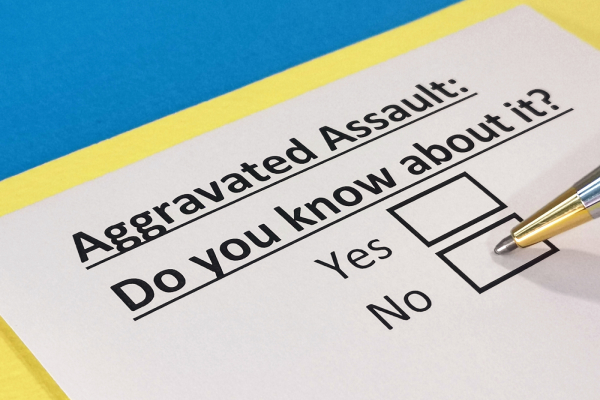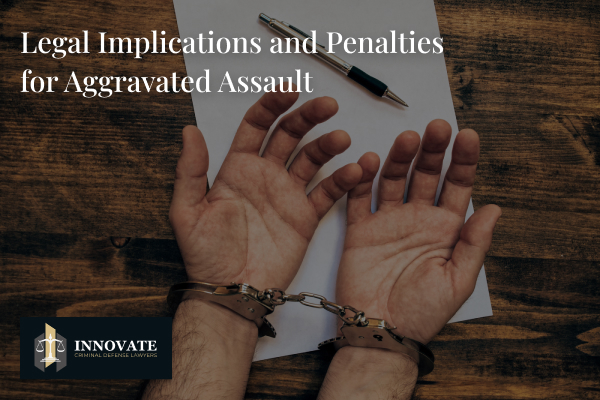
Aggravated assault is a serious crime that goes beyond a simple assault charge in Maryland. It involves an attack that leads to serious bodily injury or employs a deadly weapon. Knowing the specifics of this charge is important because it carries severe legal consequences.
If you're facing an aggravated assault charge, knowing the ins and outs of this offense can help you go through the legal system. Aggravated assault cases in Maryland are treated with utmost seriousness due to the potential harm to the alleged victim.
At Innovate Criminal Defense Lawyers, we are here to defend your rights. The distinction between aggravated assault and other forms of assault lies in the severity of the injury to the victim and the circumstances under which the assault occurred. Learn more below. Then, contact us for a case consultation.
Aggravated assault in Maryland involves intentionally causing serious bodily injury to another person. This can also include assaults where the perpetrator exhibits extreme indifference to human life.
The legal system considers an assault to be "aggravated" if it involves factors that elevate its severity compared to a simple assault. These factors typically include the use of deadly weapons or the intent to commit serious bodily harm.
Furthermore, aggravated assault is categorized as a felony, reflecting its severity and the strict penalties associated with a conviction. This classification differentiates it from simple assault, which might be treated as a misdemeanor depending on the circumstances. Felony charges signal the serious nature of the offense and the considerable legal implications for the accused. It's vital to understand these legal distinctions when facing charges or when involved in legal proceedings.

The penalties for aggravated assault in Maryland are severe, reflecting the major nature of the crime. A conviction can trigger long prison sentences, hefty fines, and a permanent criminal record. The specific sentencing can vary based on the severity of the injury to the victim, the use of weapons, and the accused's criminal history.
Maryland law (Maryland Code, Criminal Law Section 3-202) outlines the penalties for first-degree assault (aggravated assault), including up to 25 years in prison. This is indicative of the gravity with which the state views aggravated assault. The long-term impact of such a conviction cannot be understated, affecting employment opportunities, housing, and personal relationships.
Intent plays a critical role in determining the severity of the charges and any possible penalties. An assault committed with the clear intention to cause serious harm or death is more likely to result in severe punishment. Similarly, the use of deadly weapons in the commission of an assault notably increases the gravity of the offense and, consequently, the harshness of the sentence.
A conviction for aggravated assault can have profound and lasting effects on an individual's life. Beyond the immediate legal penalties, it can result in a permanent criminal record, limiting employment opportunities and affecting personal relationships. The stigma of a violent crime conviction is challenging to overcome, underscoring the importance of a robust defense.
Self-defense is a powerful defense in assault cases, but proving it requires meeting specific criteria. The defendant must demonstrate that they believed they were in immediate danger of bodily harm and that the force used was necessary to prevent that harm. Furthermore, the amount of force used in self-defense must be reasonable in relation to the threat faced.

The size of bail in an aggravated assault case can be influenced by several factors, including the severity of the alleged offense, the defendant's criminal history, their ties to the community, and the perceived risk of flight. The court's goal is to ensure the defendant's appearance at future court dates while protecting the community.
Facing aggravated assault charges without legal representation can have devastating consequences. An experienced criminal defense attorney can guide you through the complexities of the legal system, ensuring that your rights are protected. Early intervention by a lawyer can also open up more options for defense and potentially lead to a more favorable outcome.
Deciding between accepting a plea bargain and going to trial is a critical decision that should be made with your attorney's guidance. A plea bargain can sometimes offer a guaranteed outcome and potentially lesser penalties, but it requires admitting guilt to a crime. A trial presents a chance to prove innocence but comes with risks, including the possibility of a harsher sentence if convicted. Aggravated assaults can be met with a stiff penalty.
While there's no guarantee, a skilled attorney can highly increase the chances of getting your case dismissed. By challenging the prosecution's evidence, demonstrating violations of your rights, or negotiating with prosecutors, your lawyer can work towards the best possible outcome, including case dismissal. Assault and aggravated assault charges are serious. Contact us today for a case consultation if you have been accused of injuring someone through physical contact.

If you're facing aggravated assault charges in Maryland, it's important to act quickly and secure experienced legal representation. Innovate Criminal Defense Lawyers have the experience and dedication to provide the defense you need. We understand the stakes and are committed to fighting for your rights.
Violent crimes, including aggravated sexual assault, are prosecuted vigorously. If you have been accused of causing great bodily harm or felonious assault, contact us today for a case consultation.